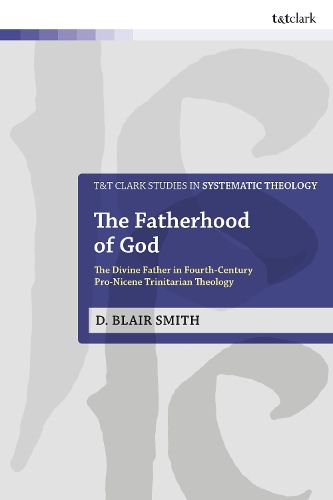Readings Newsletter
Become a Readings Member to make your shopping experience even easier.
Sign in or sign up for free!
You’re not far away from qualifying for FREE standard shipping within Australia
You’ve qualified for FREE standard shipping within Australia
The cart is loading…






Examines what the formative writers of the fourth century said about divine fatherhood in order to address a key subject in Trinitarian debate in modern theology.
D. Blair Smith examines the Father within classical Trinitarian thought. The question of the fatherhood of God occupied several 20th - 21st century theologians who sought to retrieve fourth-century Trinitarian developments in order to inform their systematic concerns. He explores the foundational period and engages with a number of the formative 'pro-Nicene' voices of Athanasius of Alexandria, Hilary of Poitiers, Gregory of Nazianzus, and Basil of Caesarea. Smith examines the crucial theological space given to eternal generation of the Son, divine simplicity, the coinherence of the persons, inseparability of operations, and even the Holy Spirit in order to understand the distinctiveness of the Father within the Trinity.
He argues Basil represents the most integrative pro-Nicene account of divine fatherhood, providing sharpness to the mature pro-Nicene Trinitarian categories emerging within this era and critically applies insights gleaned from the pro-Nicene development to questions raised by modern readings of the 'first' person of the Trinity as well as identify trailhead for further inquiry on the fatherhood of God within contemporary Trinitarian thought.
$9.00 standard shipping within Australia
FREE standard shipping within Australia for orders over $100.00
Express & International shipping calculated at checkout
Examines what the formative writers of the fourth century said about divine fatherhood in order to address a key subject in Trinitarian debate in modern theology.
D. Blair Smith examines the Father within classical Trinitarian thought. The question of the fatherhood of God occupied several 20th - 21st century theologians who sought to retrieve fourth-century Trinitarian developments in order to inform their systematic concerns. He explores the foundational period and engages with a number of the formative 'pro-Nicene' voices of Athanasius of Alexandria, Hilary of Poitiers, Gregory of Nazianzus, and Basil of Caesarea. Smith examines the crucial theological space given to eternal generation of the Son, divine simplicity, the coinherence of the persons, inseparability of operations, and even the Holy Spirit in order to understand the distinctiveness of the Father within the Trinity.
He argues Basil represents the most integrative pro-Nicene account of divine fatherhood, providing sharpness to the mature pro-Nicene Trinitarian categories emerging within this era and critically applies insights gleaned from the pro-Nicene development to questions raised by modern readings of the 'first' person of the Trinity as well as identify trailhead for further inquiry on the fatherhood of God within contemporary Trinitarian thought.